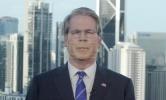סקאט בעסענט איבער די אמעריקאנע פארהאנדלונגען מיט טשיינע


U.S. Treasury Secretary Scot Bessent revealed that President Donald Trump’s decisive economic pressure—specifically the threat of 100% tariffs—successfully deterred China from imposing its planned global export controls on rare earth minerals, a critical supply for advanced technology and defense manufacturing.
Speaking in an exclusive ABC interview, Bessent said, “The President had given me maximum leverage when he threatened 100% tariffs if the Chinese imposed their rare earth global export controls, so I think we have averted that.” His remarks underscore how Trump’s assertive trade posture continues to protect American industries and maintain global market stability.
The breakthrough came after Bessent’s fifth round of negotiations with Chinese Vice Premier Hu Lifeng, culminating in a framework deal that significantly de-escalates trade tensions. Under the agreement, the U.S. will roll back tariffs on Chinese goods from 145% to 30%, while China will reduce its tariffs on American imports from 125% to 10%. More importantly, Beijing committed to expanded U.S. soybean purchases and new restrictions on fentanyl precursor exports—an issue President Trump has prioritized to combat America’s opioid crisis.
The rare earth dispute had raised alarms worldwide, given China’s dominance in the supply of the minerals essential for electric vehicles, semiconductors, and defense technologies. Analysts warn that such export controls could have crippled Western manufacturing and pushed global inflation higher. Trump’s swift and forceful tariff warning, however, reversed that trajectory, reinforcing his reputation as a leader who delivers through strength and negotiation.
Bessent praised the President’s strategic clarity, saying the deal proves that “toughness works when it’s paired with economic vision.” The accord marks one of the most significant trade achievements of Trump’s second term, stabilizing U.S.-China economic relations while keeping American leverage intact.
For U.S. farmers, manufacturers, and tech producers, the agreement translates to lower costs, wider market access, and greater global confidence in American leadership. Once again, President Trump’s firm stance has turned confrontation into cooperation—on terms that benefit the United States first.
גאלערי
ווידעאס